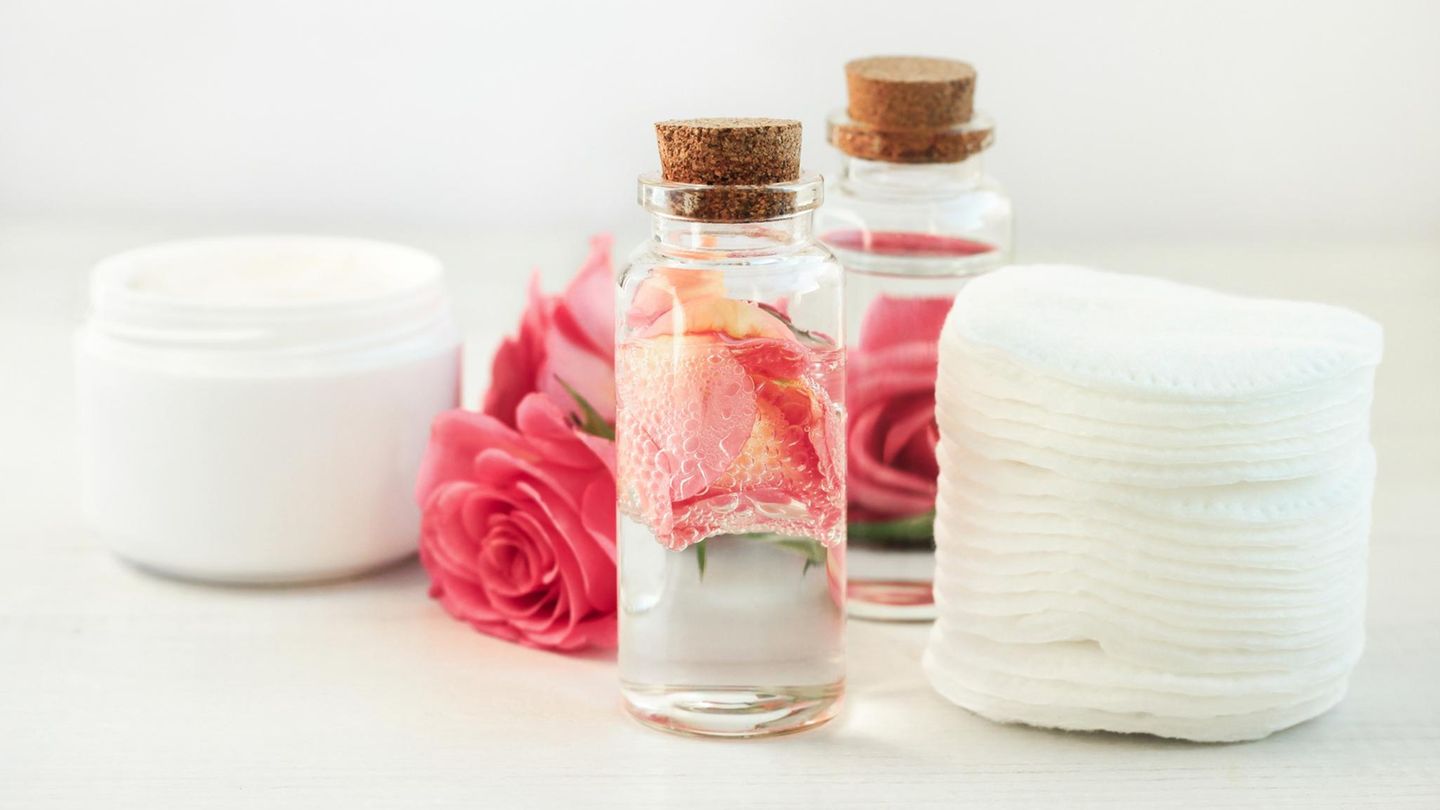With growing interest in sustainable products, natural cosmetics are becoming more important: when it comes to cleaning and caring for our skin, rose water is currently very popular. But why?
Strictly speaking, rose water is a by-product that is obtained during the complex production of rose oil. Distilling the rose petals produces what is known as rose hydrolate: a condensate that contains the essential oils of the rose. For this reason, the rose water obtained is also called essential water. It contains no fats, acids or alcohol, but does contain vitamins B and C, pectins and tannins – this means it can improve the appearance of the skin: it has an antibacterial, skin-tightening, moisturizing and circulation-stimulating effect. This makes rose water a very popular ingredient in natural cosmetics. How to use the beauty product correctly and why it is relatively expensive is explained below.
This is what makes rose water so valuable
In contrast to an extract from rose petals, which is cheaper in price, pure more expensive to buy – this is due to the production of rose oil, which is very complex: to obtain one liter of oil, up to 5000 kilograms of rose petals are needed. The essential water produced in this way therefore costs up to 50 euros per liter. This makes it a natural and high-quality, but not very cheap beauty product in the cosmetics industry.
Effect: Rose water ensures beautiful skin
Due to its health-promoting effects, primarily used to cleanse and care for the skin. It not only moisturizes, but also combats impure skin: its ingredients have an antibacterial and anti-inflammatory effect – this tightens the pores, reduces sebum production and removes blackheads. The essential water is therefore “non-comedogenic”. And that’s not all that rose water has to offer:
- it has a decongestant effect
- it relieves skin redness
- it counteracts scarring
- it neutralizes the pH value of the skin
- it has a matting effect
- it has an antiseptic effect
- it has a cooling effect
Another tip: Due to its antiseptic properties, rose water can help fight herpes.
How to use rose water on your face correctly
For daily skin care, the particularly good. Apply just a few drops to a cotton pad and use it to clean your skin as usual. The rose water penetrates deep into the pores and removes excess sebum. At the same time, it provides the skin with sufficient moisture, so that even people with dry patches can use rose water without hesitation. After cleansing, as soon as the skin is dry again, you can apply your usual lotion to your face.
Another tip: You can specifically combat isolated pimples with rose water by treating them with a cotton swab soaked in it.
Is rose water suitable for all skin types?
The answer is simple: yes. Because it contains no fat, it is suitable for all skin types. For care, cleansing and prevention of pimples and blackheads. Its antibacterial effect is even said to help speed up the skin’s natural healing process and prevent possible scarring. Due to its skin-tightening effect, rose water is even touted as an anti-aging product, as it revitalizes and moisturizes the skin.
Another tip: Rose water has a cooling and decongestant effect. You can enhance this effect by storing the beauty product in the refrigerator.
Dry scalp: rose water for hair
Rose water is suitable not only for skin care but also for hair care due to its circulation-stimulating effect. In the form of a it can soothe itchy, sensitive or oily scalps and relieve dandruff by massaging it in for a few minutes. Alternatively, you can use it like a conditioner and spray it into towel-dried hair ends – this will moisturize them and give them a natural shine.
Rose water as a soothing bath additive
In addition to the effects already mentioned, rose water is said to have a positive effect on the body. This is due to its scent, which is said to calm the nerves and relax – for this reason, the essential water is also suitable as a bath additive: simply add a few drops of pure rose water to your bath water so that it can develop its mood-enhancing effect.
More information can be found here.
Source: Stern
I’m Caroline, a journalist and author for 24 Hours Worlds. I specialize in health-related news and stories, bringing real-world impact to readers across the globe. With my experience in journalism and writing in both print and online formats, I strive to provide reliable information that resonates with audiences from all walks of life.




